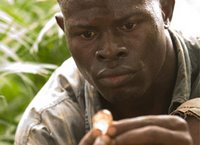 Political sensitivity and Hollywood convention have never had the easiest working relationship. Before a discussion of a political film can get into the sophistication and balance of its examination, a script has to be equivocal and nuanced, subtle and measured. The narrative tropes of the Hollywood thriller - the love interest, revenge and catharsis, or extreme danger - often lumber a delicate political idea with excess baggage.
Political sensitivity and Hollywood convention have never had the easiest working relationship. Before a discussion of a political film can get into the sophistication and balance of its examination, a script has to be equivocal and nuanced, subtle and measured. The narrative tropes of the Hollywood thriller - the love interest, revenge and catharsis, or extreme danger - often lumber a delicate political idea with excess baggage.Blood Diamond is such a film. Although an exhilarating and quite accomplished thriller (if not a particularly memorable one), Edward Zwick’s latest weighs itself down with disjointed banter and misplaced emphases. Set in civil war-stricken Sierra Leone in 1999, the film’s harrowing opening sequence sees fisherman Solomon Vandy’s (Djimon Hounsou) teenage son abducted by rebels to be transformed into a machine-gun wielding soldier of the cause. Vandy is spared to work in the diamond fields, where he finds a sizable, priceless diamond and hides it. After the government raids the operation, he crosses paths with Leonardo DiCaprio’s Danny Archer, a former Zimbabwean soldier turned mercenary and diamond hunter. Archer learns of Solomon’s secret and begs him for the location; in return he will help Solomon find his family.
Blood Diamond certainly scores points in muddying its white lead’s ethics, far moreso than those of Tom Cruise in Zwick’s last effort, The Last Samurai. Archer is ruthless and selfish, and for most of the running time we are unsure of whether he cares a thing for Solomon and his plight. However, it’s still a shame that a commercial American film about Africa needs a white window into the story. Sure, DiCaprio’s character is African himself, but his arc reveals little of the social and economic situations plaguing African nations, whereas Hounsou’s Solomon is in the thick of it, and could speak volumes about the issue if he were placed at centre stage. Instead, Solomon is occasionally told to wait while Archer discusses something with journalist Maddy (Jennifer Connelly) or his boss (Arnold Vosloo), exposing an unsettling disparity. And while Zwick’s compassion for those citizens blighted by the conflict diamond trade is clear – this is far more conscientious a script than it could otherwise have been, and Solomon is hardly inconsequential – he still makes unfortunate concessions to middle-of-the-road Western perceptions about Africa. For instance, we are forced to endure Connelly get out of trouble with angry forest-dwelling locals by sweet-talking them into some photos, with one commenting to his men that she reminds him of her wife. Please…
There are several such occasions that draw us away from the sincerity of the topic, veering the film away from Constant Gardener territory into somewhere more dismaying. With this and The Last Samurai, Zwick is developing a trend for morally troubled but otherwise heroic white guys doing great things for a distant people, whereas in Fernando Meirelles’s film the very point was the effect that Western dominance and exploitation was having on Africa. Blood Diamond is less probing than that, briefly featuring the London diamond buyers at the end but refusing to inject any shades of grey or explore the complexities of their end of the deal. Zwick's film certainly works as a potential trigger for audiences to consider these issues, but doesn’t take us much further than that. And strong performances by Hounsou and DiCaprio (sporting a quality accent) and intense action sequences certainly make that trigger more likely to fire in some viewers. It’s worth a shot.
No comments:
Post a Comment